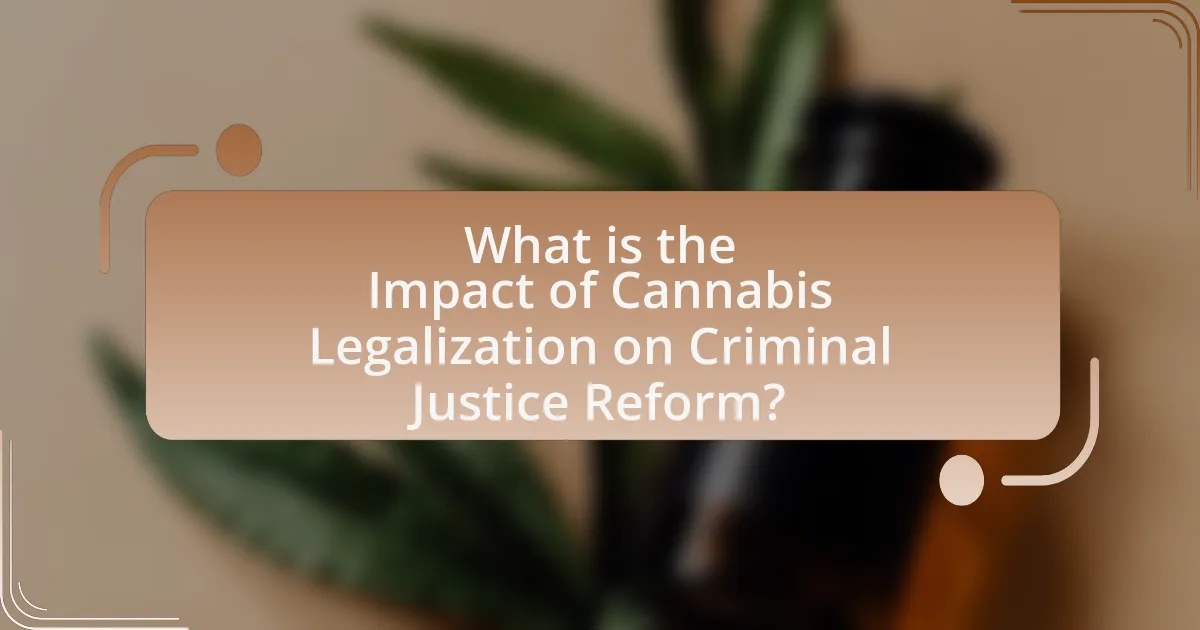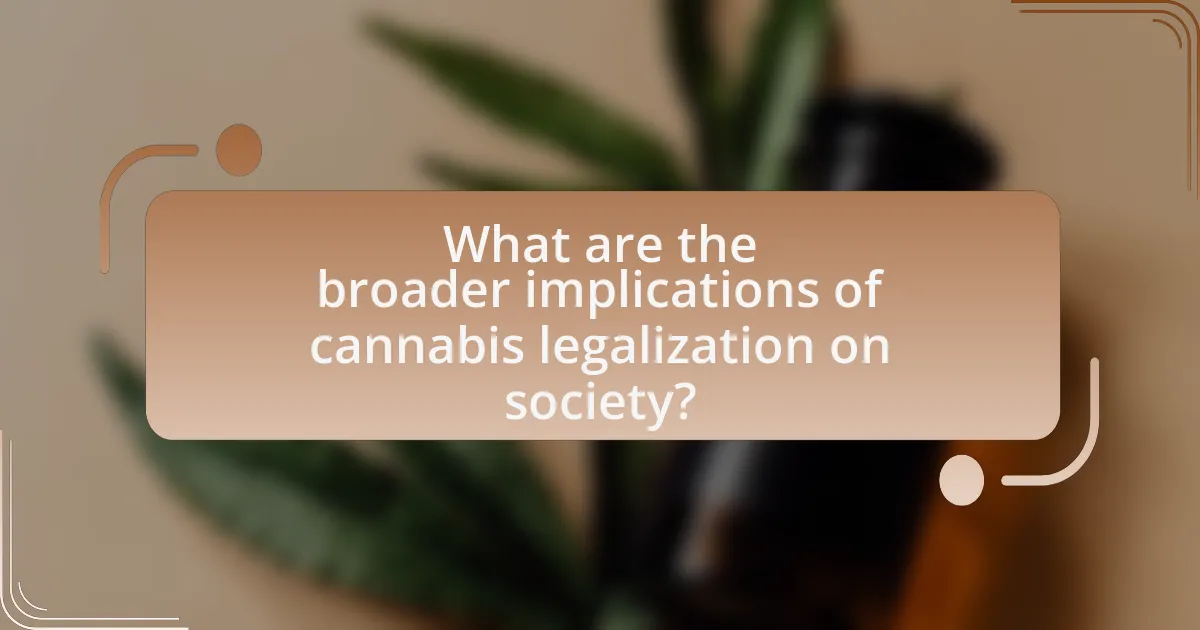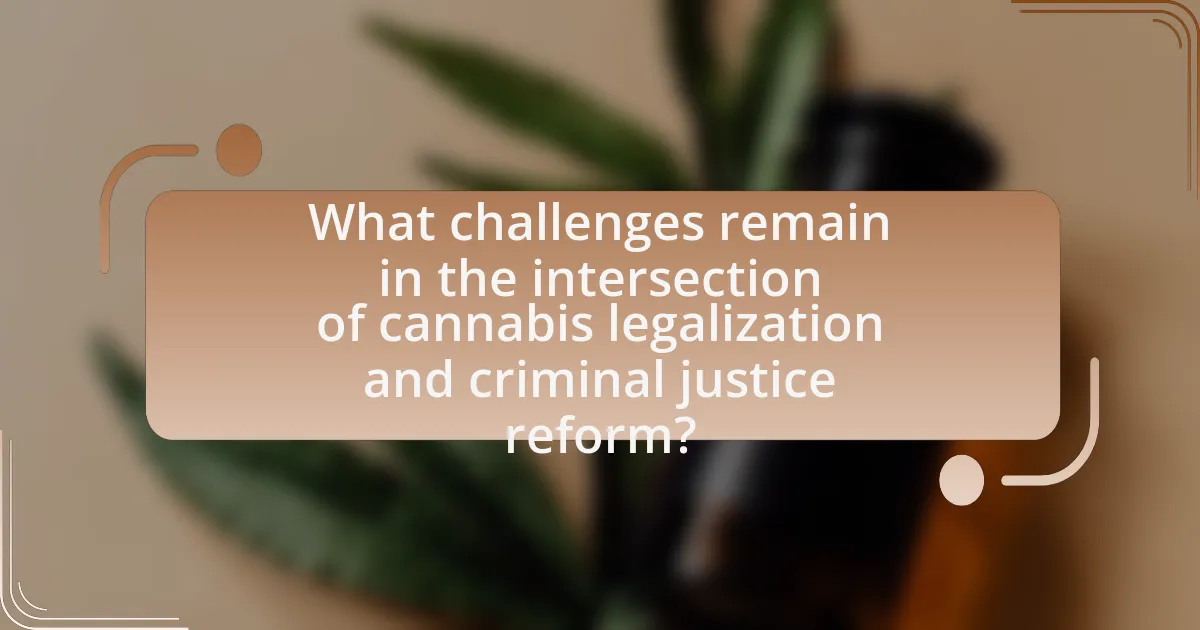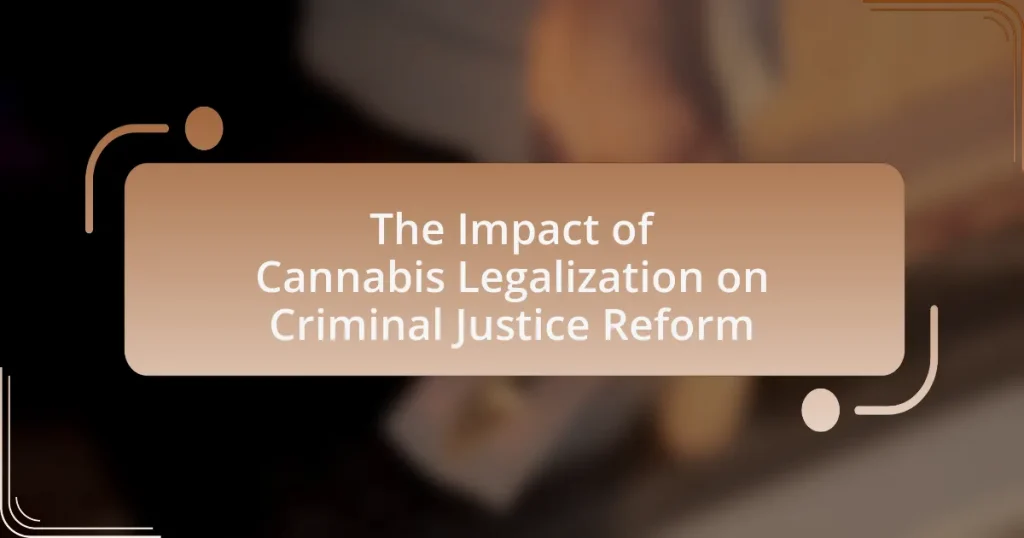The article examines the impact of cannabis legalization on criminal justice reform, highlighting significant reductions in arrests and incarceration rates for drug-related offenses. It discusses how states that have legalized cannabis, such as Colorado and Washington, have experienced dramatic declines in marijuana-related arrests, allowing law enforcement to focus on more serious crimes. The article also addresses the importance of expunging past cannabis-related convictions to rectify historical injustices, particularly those affecting marginalized communities. Additionally, it explores the broader societal implications of legalization, including economic benefits, public health outcomes, and shifts in community attitudes toward law enforcement.

What is the Impact of Cannabis Legalization on Criminal Justice Reform?
Cannabis legalization significantly impacts criminal justice reform by reducing arrests and incarceration rates for drug-related offenses. In states where cannabis has been legalized, there has been a notable decline in marijuana-related arrests; for example, a report from the American Civil Liberties Union (ACLU) indicated that marijuana arrests dropped by over 80% in some jurisdictions post-legalization. This shift not only alleviates the burden on the criminal justice system but also allows law enforcement to redirect resources toward more serious crimes. Furthermore, legalization often includes provisions for expunging past cannabis-related convictions, which helps address the long-term consequences of previous drug policies on individuals and communities.
How has cannabis legalization changed the landscape of criminal justice?
Cannabis legalization has significantly altered the landscape of criminal justice by reducing arrests and incarceration rates for cannabis-related offenses. For instance, states that have legalized cannabis, such as Colorado and Washington, have reported a dramatic decrease in marijuana-related arrests, with Colorado seeing a 50% drop in such arrests since legalization in 2012. This shift has allowed law enforcement to redirect resources toward more serious crimes, thereby impacting overall crime rates and public safety. Additionally, legalization has prompted discussions around expungement of past cannabis convictions, further reforming the criminal justice system by addressing historical injustices related to drug enforcement.
What specific laws have been enacted following cannabis legalization?
Following cannabis legalization, specific laws such as the Marijuana Opportunity Reinvestment and Expungement (MORE) Act and various state-level measures have been enacted. The MORE Act, introduced in Congress, aims to decriminalize cannabis at the federal level and includes provisions for expunging prior cannabis-related convictions. Additionally, states like California and Colorado have implemented laws to automatically expunge records for individuals with past cannabis offenses, reflecting a shift in criminal justice reform related to cannabis. These legislative changes demonstrate a significant move towards addressing the consequences of previous cannabis prohibition.
How do these laws affect arrest and incarceration rates?
Cannabis legalization laws significantly reduce arrest and incarceration rates for drug-related offenses. For instance, states that have legalized cannabis have seen a marked decrease in arrests for possession, with a 2019 report from the American Civil Liberties Union indicating that marijuana arrests dropped by over 80% in some jurisdictions post-legalization. Additionally, incarceration rates have also declined, as fewer individuals are imprisoned for non-violent drug offenses, contributing to a broader trend of criminal justice reform aimed at reducing the prison population.
Why is criminal justice reform important in the context of cannabis legalization?
Criminal justice reform is important in the context of cannabis legalization because it addresses the disproportionate impact of cannabis prohibition on marginalized communities. Historical data shows that despite similar usage rates, Black individuals are nearly four times more likely to be arrested for cannabis-related offenses than white individuals. This systemic inequality necessitates reform to rectify past injustices and prevent future discrimination. Additionally, legalizing cannabis creates opportunities to expunge prior convictions, thereby reducing the long-term consequences of criminal records on individuals’ lives and promoting social equity.
What historical injustices are addressed by cannabis legalization?
Cannabis legalization addresses historical injustices primarily related to racial discrimination and the disproportionate impact of drug enforcement policies on marginalized communities. For instance, data from the American Civil Liberties Union (ACLU) indicates that Black individuals are nearly four times more likely to be arrested for cannabis possession than white individuals, despite similar usage rates. This systemic bias has led to significant social and economic disadvantages for these communities, including incarceration, loss of employment opportunities, and barriers to housing. Furthermore, cannabis legalization efforts often include provisions for expunging past convictions, which helps rectify some of the harm caused by these unjust policies and promotes equity in the legal system.
How does cannabis legalization contribute to social equity?
Cannabis legalization contributes to social equity by addressing the disproportionate impact of drug enforcement on marginalized communities. Legalization allows for the expungement of criminal records related to cannabis offenses, which can improve access to employment, housing, and education for individuals previously affected by these laws. For instance, a report from the American Civil Liberties Union (ACLU) highlights that Black individuals are 3.64 times more likely to be arrested for cannabis possession than white individuals, demonstrating systemic racial disparities in enforcement. By legalizing cannabis, states can redirect resources from enforcement to community investment, thereby promoting economic opportunities and reducing inequalities.

What are the broader implications of cannabis legalization on society?
Cannabis legalization has significant broader implications on society, particularly in areas such as criminal justice reform, public health, and economic development. Legalization reduces the number of arrests related to cannabis possession, which historically has disproportionately affected marginalized communities; for instance, a 2020 report from the American Civil Liberties Union indicated that Black individuals are 3.64 times more likely to be arrested for cannabis possession than white individuals, despite similar usage rates.
Furthermore, legalization can lead to increased tax revenue, as seen in states like Colorado, which generated over $1.7 billion in cannabis tax revenue since legalization in 2014, funding education and public health initiatives. Public health outcomes may also improve, as regulated markets can ensure product safety and reduce the risks associated with unregulated cannabis use.
Overall, the implications of cannabis legalization extend beyond individual use, influencing societal structures, economic opportunities, and public health policies.
How does cannabis legalization influence public perception of law enforcement?
Cannabis legalization generally leads to a more favorable public perception of law enforcement. As jurisdictions legalize cannabis, surveys indicate that public trust in police often increases, particularly among demographics that previously viewed law enforcement negatively due to cannabis-related arrests. For instance, a 2020 Gallup poll found that 68% of Americans supported cannabis legalization, correlating with a growing belief that law enforcement should focus on serious crimes rather than cannabis offenses. Additionally, states that have legalized cannabis report a decrease in cannabis-related arrests, which can enhance community relations and reduce perceptions of police as enforcers of outdated drug laws. This shift in perception is further supported by research from the American Journal of Public Health, which highlights that communities with legalized cannabis experience improved interactions with law enforcement, fostering a sense of safety and cooperation.
What role does media play in shaping views on cannabis and criminal justice?
Media plays a crucial role in shaping public views on cannabis and criminal justice by influencing perceptions, disseminating information, and framing narratives. Through news coverage, documentaries, and social media, media outlets highlight the consequences of cannabis prohibition, such as racial disparities in arrests and incarceration rates. For instance, a report by the American Civil Liberties Union (ACLU) in 2020 revealed that Black individuals are 3.64 times more likely to be arrested for cannabis possession than white individuals, a statistic often emphasized in media discussions. This framing can lead to increased public support for reforming cannabis laws and addressing systemic injustices within the criminal justice system. Additionally, media representation of cannabis users and legalization efforts can shift societal attitudes, making reform more politically viable.
How do community attitudes shift with cannabis legalization?
Community attitudes shift positively with cannabis legalization, often leading to increased acceptance and support for cannabis use. Research indicates that as states legalize cannabis, public opinion tends to become more favorable; for instance, a 2021 Gallup poll showed that 68% of Americans support legalization, a significant increase from 25% in 1995. This shift is attributed to factors such as increased awareness of the medicinal benefits of cannabis, reduced stigma, and recognition of the failures of previous prohibition policies. Additionally, communities that have experienced legalization report lower rates of cannabis-related arrests, further reinforcing positive attitudes toward its use and contributing to broader discussions on criminal justice reform.
What economic impacts arise from cannabis legalization related to criminal justice?
Cannabis legalization leads to significant economic impacts related to criminal justice by reducing law enforcement costs and generating tax revenue. Legalization decreases the financial burden on the criminal justice system, as fewer resources are allocated to arresting, prosecuting, and incarcerating individuals for cannabis-related offenses. For instance, a report from the American Civil Liberties Union indicates that states could save approximately $1 billion annually in law enforcement costs associated with cannabis prohibition. Additionally, legalized cannabis markets create new tax revenue streams; for example, Colorado generated over $1.5 billion in tax revenue from cannabis sales since legalization in 2014, which can be reinvested into community programs and criminal justice reform initiatives.
How does cannabis taxation contribute to funding criminal justice reform initiatives?
Cannabis taxation directly contributes to funding criminal justice reform initiatives by generating significant revenue that can be allocated to various programs aimed at improving the justice system. For instance, states like Colorado and California have implemented taxes on cannabis sales, with a portion of the revenue specifically earmarked for criminal justice reform efforts, including expungement programs for past cannabis-related offenses. In Colorado, over $12 million was allocated in 2020 alone to support such initiatives, demonstrating a tangible financial commitment to reform. This funding helps address issues like over-policing and the disproportionate impact of drug laws on marginalized communities, thereby facilitating a more equitable justice system.
What job opportunities are created in the legal cannabis industry?
The legal cannabis industry creates a variety of job opportunities, including roles in cultivation, processing, distribution, retail, and compliance. Cultivation jobs involve growing cannabis plants, while processing roles focus on extracting oils and creating products. Distribution jobs include logistics and transportation of cannabis products, and retail positions encompass sales and customer service in dispensaries. Compliance roles ensure adherence to regulations and legal standards. According to a report by Leafly, the legal cannabis industry employed over 400,000 workers in the United States as of 2021, highlighting significant job creation in this sector.

What challenges remain in the intersection of cannabis legalization and criminal justice reform?
Challenges in the intersection of cannabis legalization and criminal justice reform include the ongoing criminalization of cannabis-related offenses in some jurisdictions, disparities in enforcement, and the need for expungement of past convictions. Despite legalization in many areas, individuals can still face arrest for possession in regions where it remains illegal, leading to inconsistent legal landscapes. Additionally, studies indicate that racial disparities persist in cannabis-related arrests, with minorities disproportionately affected even in legalized states. Furthermore, the expungement process for prior cannabis convictions is often complex and not uniformly implemented, leaving many individuals without relief from the consequences of past offenses. These challenges highlight the need for comprehensive reform that addresses both legalization and the historical injustices of cannabis prohibition.
What ongoing legal issues are faced by states that have legalized cannabis?
States that have legalized cannabis face ongoing legal issues primarily related to federal law conflicts, banking restrictions, and regulatory inconsistencies. Despite state-level legalization, cannabis remains classified as a Schedule I substance under the Controlled Substances Act, creating legal risks for state-licensed businesses and users. Additionally, banks are often reluctant to provide services to cannabis businesses due to federal regulations, leading to cash-only operations that heighten security risks. Furthermore, discrepancies in state laws regarding cannabis use, distribution, and taxation can lead to legal ambiguities and enforcement challenges, complicating the regulatory landscape for both businesses and law enforcement.
How do federal laws conflict with state cannabis legalization efforts?
Federal laws conflict with state cannabis legalization efforts primarily because cannabis remains classified as a Schedule I substance under the Controlled Substances Act, making its use and distribution illegal at the federal level. This classification creates a legal paradox where states can enact laws permitting cannabis use, but individuals and businesses operating under those state laws can still face federal prosecution. For example, despite states like California and Colorado legalizing cannabis for recreational use, federal authorities can enforce laws against cannabis possession and distribution, leading to arrests and legal challenges. This conflict complicates law enforcement, regulatory frameworks, and the banking sector, as financial institutions are hesitant to engage with cannabis businesses due to the risk of federal penalties.
What challenges do law enforcement agencies face in adapting to legalization?
Law enforcement agencies face significant challenges in adapting to cannabis legalization, primarily due to the need for updated training and policy frameworks. As laws change, officers must understand new regulations regarding possession, distribution, and usage, which can vary widely by jurisdiction. For instance, a 2021 report from the National Conference of State Legislatures indicated that over 18 states have legalized recreational cannabis, necessitating a comprehensive understanding of these laws to avoid enforcement inconsistencies. Additionally, law enforcement must address public safety concerns, such as impaired driving, which complicates traditional enforcement methods. The lack of standardized testing for cannabis impairment further complicates these challenges, as highlighted by the National Highway Traffic Safety Administration, which notes that existing sobriety tests may not effectively measure cannabis influence. These factors create a complex environment for law enforcement as they strive to balance legal compliance with public safety.
How can stakeholders ensure effective criminal justice reform post-legalization?
Stakeholders can ensure effective criminal justice reform post-legalization by actively engaging in policy development, monitoring implementation, and advocating for equitable practices. Engaging in policy development allows stakeholders to shape laws that address the unique challenges arising from legalization, such as expunging past convictions related to cannabis offenses. Monitoring implementation ensures that reforms are executed as intended, with accountability measures in place to assess their impact on communities. Advocating for equitable practices, such as prioritizing marginalized communities disproportionately affected by previous cannabis laws, helps to rectify historical injustices. Research indicates that states like Colorado and Washington have seen reductions in cannabis-related arrests and improved community relations following such reforms, demonstrating the effectiveness of these stakeholder actions.
What best practices can be implemented to support equitable cannabis policies?
To support equitable cannabis policies, jurisdictions should implement community reinvestment programs that allocate a portion of cannabis tax revenue to communities disproportionately affected by past cannabis enforcement. Research indicates that states like California have established such programs, directing funds to education, job training, and health services, which helps to rectify historical injustices. Additionally, ensuring equitable access to cannabis business licenses for individuals from marginalized communities can promote economic opportunities; for instance, Illinois mandates that a percentage of licenses be awarded to applicants from areas with high rates of cannabis-related arrests. These practices not only foster economic equity but also contribute to broader criminal justice reform by addressing the systemic disparities created by previous cannabis prohibition policies.
How can community engagement enhance the reform process?
Community engagement can enhance the reform process by fostering collaboration between policymakers and the affected communities, ensuring that reforms are relevant and effective. Engaging community members allows for the identification of specific needs and concerns, which can lead to more tailored and impactful reforms. For instance, studies have shown that jurisdictions that involve community input in policy-making, such as those related to cannabis legalization, experience higher levels of public trust and compliance, ultimately resulting in more successful implementation of reforms. This participatory approach not only empowers communities but also leads to more equitable outcomes in the criminal justice system.
What are the key takeaways for understanding the impact of cannabis legalization on criminal justice reform?
Cannabis legalization significantly impacts criminal justice reform by reducing incarceration rates for drug-related offenses and reallocating law enforcement resources. Legalization leads to a decrease in arrests for possession, as evidenced by states like Colorado, where cannabis-related arrests dropped by over 80% post-legalization. This shift allows law enforcement to focus on more serious crimes, thereby improving overall public safety. Additionally, legalization often includes provisions for expunging past cannabis convictions, addressing historical injustices and racial disparities in drug enforcement. For instance, California’s legalization law allows individuals with prior cannabis convictions to petition for expungement, reflecting a broader trend toward restorative justice.


